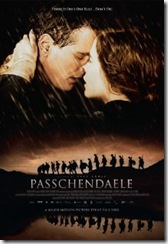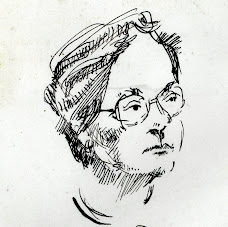After a long hiatus, I'm restarting this blog.
To begin a fortnight or so of watching films and reading books about World War I, I saw Passchendaele, a Canadian film written, produced, directed by, and starring Paul Gross, one of my favorite actors. I don’t believe this film was widely distributed in the States; I had to buy the DVD, which I seldom do.
Passchendaele, to anyone who’s read a bit about World War I history, is known as one of the most miserable, horrible, and ultimately futile battles of the war. Also known as the Third Battle of Ypres, it began October 26, 1917. British, French, and Canadian troops fought the Germans over a Belgian landscape essentially destroyed by years of shelling and months of rain. (Said landscape was below sea level in the first place, and the complicated drainage system which had made it arable and livable was all but eradicated by artillery fire.) The film Passchendaele tells the story of a Canadian unit that fought heroically against immense odds and saved the day for the Allies. The futility comes a few months later, in the spring, when the land secured with so much loss of life was quickly retaken by the Germans.
Gross had heard about this battle from his grandfather, and who told him about the incident which opens the film. He wanted to make this movie so that young Canadians would understand and take pride in their history. But it is not a jingoistic or simplistic “glorious war” film. Gross’s script shows us heroism and self-sacrifice, to be sure; it also shows the mud, filth, and blood of trench warfare; the anti-German hysteria that gripped Canada as well as the U.S. and made life hell for some German immigrants; the war fever which gave those who were too old and rich to fight license to accuse any young man not in uniform of cowardice; and the insensitive treatment of shell-shocked soldiers.
Sgt. Michael Dunne (Paul Gross), wounded in mind and body in the first scene of the film, is next seen in a Calgary hospital being cared for by nurse Sarah Mann (Caroline Dhavernas). He is immediately attracted to her but she resolutely refuses to get involved for reasons of her own. When Dunne’s physical wounds are healed, he is assigned as a recruiter because of his “neurasthenia” – shell-shock or PTSD to us, cowardice to his commanding officer. Meanwhile Sarah’s young brother, David (Joe Dinicol), who has been turned down for service because of asthma, is in love with a doctor’s daughter. The doctor gives him a letter with a clean bill of health and David enlists. Dunne volunteers to return to the front to watch over David, and eventually we see that Sarah has come to Belgium as a nurse. There is much more to the story, but I will refrain from details to avoid spoilers.
Some will find this film hokey, especially at the end. Others will certainly want to avoid it because of the violence and horror of war which it depicts so graphically. To me, it was a Ripping Yarn, a heartbreaking love story, and not least, a way to experience vicariously a little of what the soldiers of the Great War had to go through.
The DVD includes a documentary, The Road to Passchendaele, which goes in depth into the technical aspects of making a film of this type. Both the narrative film and the documentary are well worth watching. This is probably not the best World War I movie I will see, but I think it does what Paul Gross set out to do with it.


